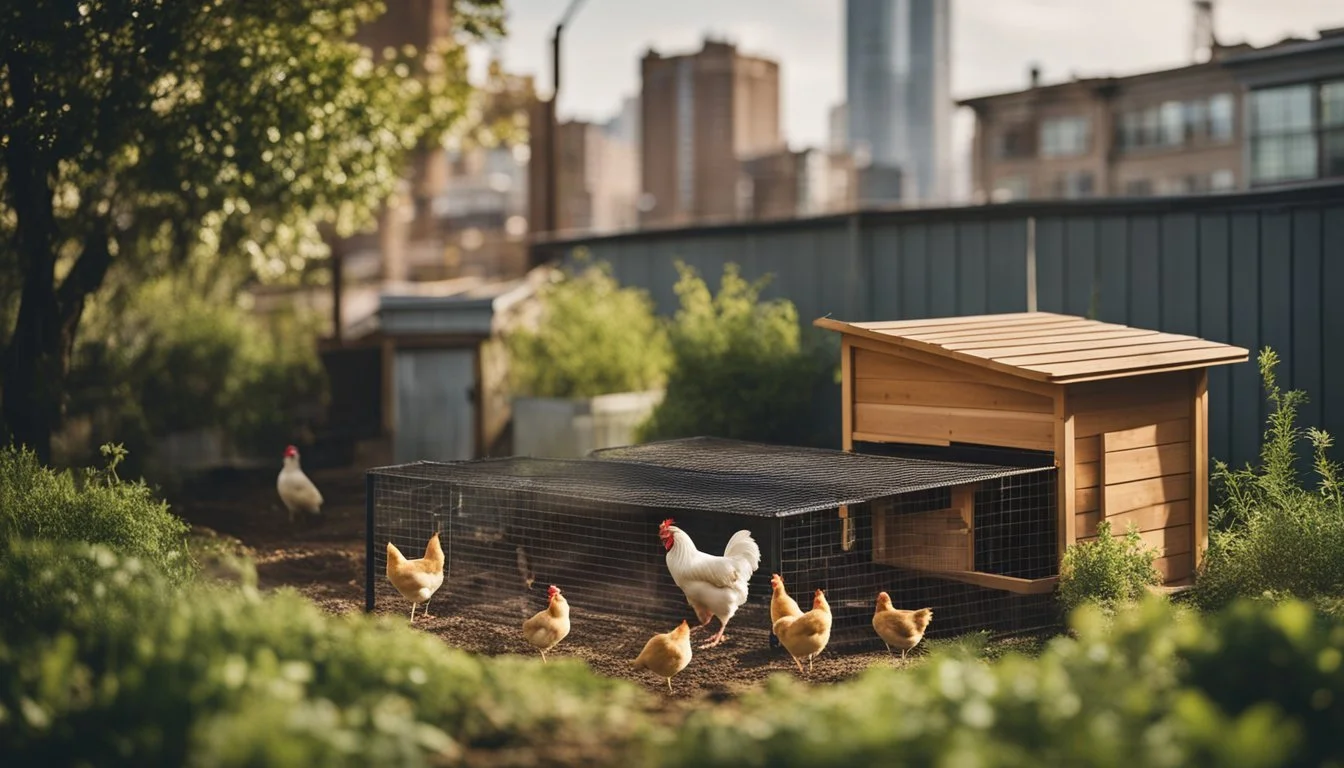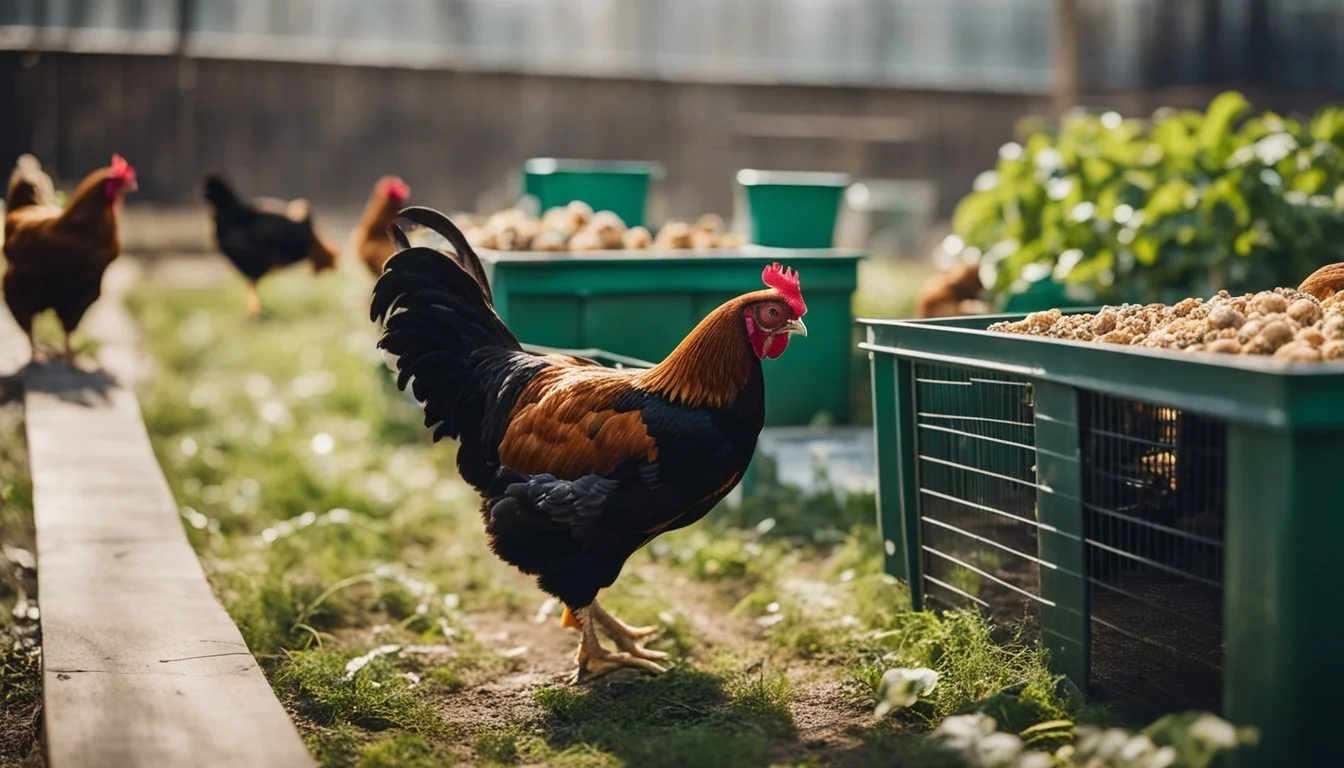7 Tips for Raising Chickens in an Urban Environment
Expert Advice for City Dwellers
Raising chickens in an urban environment is becoming increasingly popular as more city dwellers seek to enjoy the benefits of fresh eggs and sustainable living. With the right approach, city residents can successfully manage and care for their feathered friends, even in smaller spaces.
By understanding the key factors involved in urban chicken keeping, anyone can turn their backyard into a thriving haven for poultry. From choosing the right breeds to implementing effective coop management practices, these insights will help ensure a healthy and happy flock.
1) Choose Bantam Breeds
Bantam chickens are an excellent choice for urban environments. These miniature birds are easier to manage due to their smaller size. They take up less space, making them ideal for city backyards where room is limited.
Bantams also consume less feed compared to standard breeds. This can significantly reduce the costs associated with chicken keeping. Their reduced feed requirements make them both economical and efficient.
Another advantage of bantams is their temperament. They are known for being friendly and easy to handle, which is particularly beneficial for families with children. Kids can manage and interact with them more easily.
In terms of egg production, bantam eggs are smaller but richer compared to those of standard chickens. It typically takes three to four bantam eggs to match the volume of two standard eggs, yet their yolk-to-white ratio is higher.
Finally, bantams are diverse in appearance with various breeds offering a range of colors and patterns. This variety can add aesthetic value to your urban coop, making it both functional and pleasing to look at.
2) Build Predator-Proof Coop
Securing your chicken coop is essential to protect your flock from predators. The location of the coop plays a significant role; it's best to place it far from dense woods or other areas where predators might hide.
A sturdy structure is crucial. Using materials like cement or stone for the floor can prevent digging predators from entering the coop.
Hardware cloth is recommended over chicken wire. It provides better security for keeping out raccoons, foxes, and other common predators.
Ensure the run is also well-secured. It should be at least 8 feet high, and employing hardware cloth for the walls and ceiling can add an extra layer of protection.
Installing an automatic coop door adds security, especially at night. It helps ensure that chickens are safe within the coop from nocturnal predators.
For additional safety, consider burying hardware cloth or chicken wire underground to deter burrowing animals. Fasten these with industrial staples or screws and washers to ensure they stay in place.
Having a dog on patrol or supervising your chickens during free-range time can also help deter predators. These measures collectively help in creating a safe environment for your chickens in an urban setting.
3) Frequent Egg Collection
Collecting eggs daily is crucial for maintaining their quality and cleanliness. In urban environments, it helps prevent eggs from getting cracked, dirty, or damaged. Freshly laid eggs are less likely to harbor bacteria or other contaminants when promptly gathered.
Regular egg collection also discourages hens from developing the habit of breaking and eating their own eggs. This undesirable behavior can spread quickly among your flock and reduce your egg yield.
Urban chicken keepers can store eggs at room temperature or refrigerate them, depending on their preferences and local regulations. Washing eggs should be avoided unless absolutely necessary, as their natural protective coating helps to maintain freshness.
4) Feed Organic Chicken Feed
Feeding organic chicken feed ensures that chickens receive high-quality nutrition without synthetic additives. Organic feed typically consists of natural ingredients like grains, vegetables, and legumes, promoting the health and well-being of the flock.
When selecting organic chicken feed, it's critical to read the label carefully. Look for feeds that provide a balanced diet with essential nutrients like protein, vitamins, and minerals.
Quality organic chicken feed often includes ingredients such as corn, soybean meal, wheat, and barley. These ingredients offer a well-rounded diet that supports growth, egg production, and overall health.
Ensuring a consistent supply of fresh, clean water is also vital. Proper hydration works together with a nutritious diet to maintain healthy chickens.
For urban environments, it's important to store the feed in a dry, cool place to prevent spoilage and rodent infestation. Proper storage extends the shelf life of the feed and keeps it safe for consumption.
Incorporating organic herbs like calendula and oregano into the feed can provide additional health benefits. These herbs can boost the chickens' immune systems and improve overall flock health.
Using organic feed not only supports the chickens' health but also aligns with sustainable and environmentally friendly practices. This approach benefits both the flock and the planet.
5) Implement Daily Cleaning
Daily cleaning is essential for maintaining a healthy environment for urban chickens. Regularly removing waste and soiled bedding helps prevent the buildup of harmful bacteria and pests. This practice also reduces the risk of disease and ensures that the chickens have a clean place to rest and lay eggs.
Keeping the coop clean involves scrubbing down surfaces such as perches and nesting boxes. It is important to replace bedding material frequently to absorb moisture and odors effectively.
Fresh, dry bedding not only keeps the coop smelling pleasant but also aids in managing the overall hygiene of the flock. By consistently maintaining a clean environment, urban chicken keepers can promote the well-being and productivity of their birds.
6) Use Deep Litter Method
The deep litter method is an effective way to manage chicken waste and odors in an urban environment. This technique involves allowing chicken bedding and waste to accumulate and decompose on the coop floor.
Using carbon-based bedding like pine shavings, straw, or paper can help absorb moisture and control odors. It creates a natural composting system that minimizes the need for frequent cleaning.
Keeping the bedding depth between eight to eighteen inches ensures optimal absorption and prevents hard packing. Regularly turning the bedding with a pitchfork helps aerate it, maintaining a healthy composting process.
This method reduces waste disposal issues and produces nutrient-rich compost for gardens. Additionally, it provides chickens with a cleaner, healthier living environment. Regular maintenance is key, ensuring the litter remains dry and the coop ventilated.
7) Provide Fresh Water Daily
Chickens need a constant supply of fresh water to stay healthy and productive. Stale or dirty water can lead to health problems, so changing the water daily is essential.
Clean water containers regularly to prevent bacterial growth. Using natural additives like apple cider vinegar can help keep the water clean and promote the chickens' health.
Consider using automatic waterers that ensure a continuous supply of fresh water throughout the day. These systems can be particularly beneficial in hot weather, preventing dehydration.
Placing water containers in shaded areas helps keep the water cool. Chickens are more likely to drink water that isn't warm.
Monitor water levels daily and refill as needed. This habit ensures that the flock always has access to the hydration they need.
Understanding Urban Chicken Keeping
Raising chickens in a city setting provides several benefits, such as fresh eggs, natural pest control, and urban farming opportunities. Selecting suitable breeds is crucial for managing space and noise effectively.
Benefits of Raising Chickens in the City
Urban chicken keeping offers fresh, homegrown eggs. These eggs often have richer taste and higher nutrient content compared to store-bought eggs. Chickens also contribute to sustainable living by reducing food waste through composting kitchen scraps.
Another benefit is pest control. Chickens naturally forage and eat insects, reducing the need for chemical pesticides. They can help urban gardeners maintain healthier and more productive gardens.
Urban chicken keeping also plays a role in education and community building. It provides opportunities for families to learn about animal husbandry and fosters interactions among neighbors sharing similar interests.
Common Urban Chicken Breeds
Selecting the right breed is important for an urban environment. Silkies are popular due to their quiet nature and friendly disposition. They are also small, making them ideal for limited spaces.
Bantam breeds are another excellent choice for urban settings. They are smaller than standard chickens, requiring less space, and are generally less noisy. Examples include the Sebright and Japanese Bantam.
Orpingtons are known for their calm demeanor and good egg-laying capabilities. They adapt well to confined spaces and are less likely to disturb neighbors with noise.
When choosing breeds, consider factors such as climate adaptability, space, and the primary purpose of keeping chickens, whether for eggs, meat, or companionship.
Setting Up an Urban Coop
Setting up an urban coop involves careful planning regarding its location and ensuring it has essential features to keep chickens safe, healthy, and comfortable.
Choosing the Right Location
Selecting an appropriate location is critical. Chickens need a spot that provides adequate sunlight which helps in egg production. However, they also require shade to avoid overheating. A balance between sun and shade can be achieved by placing the coop near a tree or using a cover.
The coop should be easily accessible, allowing for regular cleaning and maintenance. This helps in managing waste and preventing odor build-up which is crucial in urban settings. A location with good drainage will prevent water from pooling around the coop, which can lead to health issues for the chickens.
Essential Coop Features
An urban coop needs specific features for the well-being and safety of chickens. A secure roof and walls protect against predators. The coop should have adequate ventilation to ensure fresh air circulates, reducing the risk of respiratory issues among the chickens.
Perches are important inside the coop as chickens prefer to roost at night. Additionally, a nesting box area provides a space for hens to lay eggs. Each chicken should have enough space, roughly 2-3 square feet inside the coop and 8-10 square feet in the run.
Feeding and watering systems must be convenient and efficient. Gravity-fed feeders and waterers can help in maintaining a consistent supply without much hassle. Regularly cleaning these features can prevent contamination and ensure the chickens remain healthy.
Maintaining Health and Hygiene
Raising chickens in an urban environment brings specific health and hygiene challenges. Regular maintenance and preventative measures can significantly improve the wellbeing of your flock.
Urban Chicken Health Challenges
Urban chickens may face health challenges due to confined spaces and less natural foraging opportunities. Parasites such as lice and mites are common and require regular checks. Respiratory issues can arise from poor ventilation. Providing a balanced diet with adequate calcium and protein is essential for egg production and overall health.
Additionally, urban chickens may encounter stress from noise and predators, which can weaken their immune systems. Regular health check-ups and maintaining proper nutrition can mitigate many of these issues.
Cleaning and Maintenance Tips
Maintaining cleanliness in the coop is crucial. Regularly remove droppings and replace bedding weekly to prevent disease. Ensure the waterers and feeders are cleaned daily to avoid contamination. A deep cleaning of the coop should be done monthly.
Introduce environmental enrichment such as dust baths and perches to keep the chickens active and healthy. Using natural cleaners like vinegar can help disinfect without harsh chemicals. Predator-proofing the coop with secure fencing and locks is vital to keep the chickens safe from urban wildlife. Regular inspections can help identify and resolve hygiene issues promptly.





